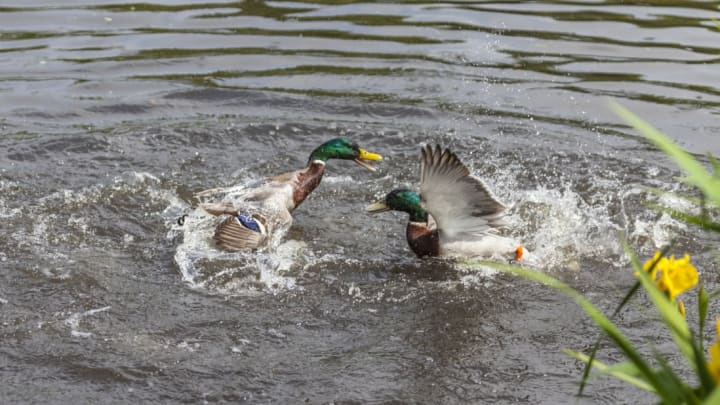The Battle of Tarawa, fought in November 1943, was a bloody Pacific offensive that led to the deaths of more than 6000 people. One of the toughest American campaigns in the central Pacific, it was an all-hands-on-deck sort of operation—one that involved 18,000 Marines and exactly one beer-guzzling duck.
"Siwash" the duck was one of the most colorful animals ever used by the military. The duck unofficially joined the United States Marine Corps in 1943 after Sergeant Francis "Pappy" Fagan won her in a raffle (some accounts say a poker tournament) at a tavern in New Zealand. According to a Marine newspaper, the duck was named after Sgt. Jack "Siwash" Cornelius of Skagit County, Washington (unfortunately, siwash is now considered a pejorative term for Native Americans of the North Pacific Coast). Siwash would accompany Fagan everywhere he went and quickly became the 2nd Marine Division's unofficial mascot.
The soldiers also loved feeding her beer. "She won't touch draft beer though," Fagan told the United Press. "And it's got to be warm beer, the way it was in New Zealand."
Her drinking prowess aside, Siwash's bravery was also much admired by the Marines, who claimed the duck would "jump in a foxhole the minute the Marines leap," according to the AP. As Colonel Presley M. Rixey joked to the Chicago Tribune in 1944, "We value him too much to have to eat him … Besides, we have no sliced oranges to serve with him." (Most of the soldiers assumed Siwash was a drake, or he-duck, although she later surprised them by laying an egg.)
During the Battle of Tarawa, Siwash truly proved she had the stuff to be a Marine. With bullets and bombs flying, the Marines stormed the beach and the duck followed—and the moment her webbed feet hit the sand she began looking for trouble. Immediately, Siwash locked eyes on a Japanese chicken and ran in pursuit. The birds began to engage in combat. Siwash took a few hard knocks to the noggin, but kept fighting until, according to most accounts, she defeated the enemy foul. As Fagan told the AP in 1944, "The rooster didn't have a chance."
After the battle, talk spread of giving Siwash a Purple Heart. In the end, she was awarded this citation:
For courageous action and wounds received on Tarawa, in the Gilbert Islands, November 1943. With utter disregard for his own personal safety, Siwash, upon reaching the beach, without hesitation engaged the enemy in fierce combat, namely, one rooster of Japanese ancestry, and though wounded on the head by repeated pecks, he soon routed the opposition. He refused medical aid until all wounded members of his section had been taken care of.
Tarawa wouldn't be Siwash's last rodeo. She was present for two more major Pacific operations: the Battle of Saipan and the Battle of Tinian. During the former, she kept watch from the boat. But at Tinian, Siwash "hit the beach on D-Day and personally captured a tiny Jap duck," TIME reported in 1944.
Later that same year Sergeant Siwash returned to the United States and was given a hero's welcome, which included two radio broadcast appearances, a luncheon in her honor, and all the beer she pleased. Harnessing the duck's fame, Fagan and Siwash went on to travel and promote the sale of war bonds. After World War II, Siwash took up residence at Chicago's Lincoln Park Zoo, where she stayed until her death (of liver problems) in 1954. Her body was stuffed and presented to the National Museum of the Marine Corps in Triangle, Virginia.
Decades later, in 1980, Fagan would confess at a retirement party that Siwash might not have been as brave as he originally let on. "Actually, the chicken chased the hell out of her," he admitted. But Fagan, it appears, was clever enough to know that he shouldn't let the truth get in the way of a good story.
After all, Siwash was no chicken.
